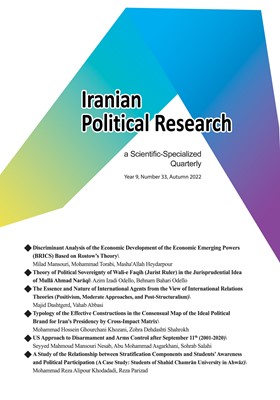The Essence and Nature of International Agents from the View of International Relations Theories (Positivism, Moderate Approaches, and Post-Structuralism)
Subject Areas : Iranian Political Research
Majid Dashtgerd
1
![]() ,
Vahab Abbasi
2
,
Vahab Abbasi
2
1 - Ph.D., Department of International Relations, Faculty of Law and Political Sciences, Allameh Tabatabai University, Tehran, Iran
2 - Master's degree, Department of Middle East Studies, Faculty of Law and Political Sciences, Allameh Tabatabai University, Tehran, Iran
Keywords: Positivism, Post-Structuralism, Moderate Approaches, International Relations Theories, Positivist Approach,
Abstract :
The subject of the essence and nature of international relations' agents is an ontological and philosophical discussion which deals with the analysis of the identity of public relations' agents and attempts to answer the following questions: Who are agents of international relations? And what purposes and intentions do they have? And how do they perceive the world of international relations and themselves? The main purpose of the present research is to review these issues from the view of triplet approaches in international relations, that is to say, positivism (neorealism, neoliberalism, and neoclassical realism), moderate approaches (constructivism, critical theory, and English school of international relations theory), and post-structuralism (postmodernism). Indeed the main research question of the present study is: What is the perception of triplet approaches in international relations about the essence and nature of international relations' agents? The research method relies on a sort of comparative and qualitative study as it is attempted to reinforce the research hypothesis and perspective using some experimental evidence and logical arguments. The results showed that positivists have reflected a pre-social attitude while moderate approaches have offered a social and historical view, and poststructuralists have represented a mobile and pluralistic perception of the essence of the international agents.
آبراهامسن، ریتا (1393). پسااستعمارگرایی. در: مارتین گریفیتس، نظریه روابط بینالملل برای سده بیست و یکم، ترجمه علیرضا طیب. تهران: نشر نی.
بوزان، بری (1388). از جامعه بینالمللی تا جامعه جهانی. ترجمه محمدعلی قاسمی. تهران: پژوهشکده مطالعات راهبردی.
چرنوف، فرد (1393). نظریه و زَبَر نظریه در روابط بینالملل. ترجمه علیرضا طیب. تهران: نشر نی.
دهقانی فیروزآبادی، سیدجلال (1394). فرانظریه اسلامی روابط بینالملل. تهران: دانشگاه علامه طباطبایی.
دهقانی فیروزآبادی، سیدجلال (1394). نظریهها و فرانظریهها در روابط بینالملل. تهران: نشر مخاطب.
سلیمی، حسین (1389). هرمنوتیک و شناخت روابط جهانی. تهران: رخ داد نو.
والتز، کنت نیل (1393). نظریه سیاست بینالملل. ترجمه غلامعلی چگنیزاده و داریوش یوسفی. تهران: مرکز آموزش و پژوهشهای بینالمللی.
Adler, E. (2002). Constructivism and International Relations. In: Walter Carlsnaes, Thomas Risse & Beth A. Simmons, Handbook of International Relations. London: SAGE Publications.
Biersteker, T. & Weber, C. (1996). State sovereignty as social construct. Cambridge: Cambridge University Press.
Bull, H. (1990). Introduction. In: Hedley Bull, Benedict Kingsbury & Adam Roberts, Grotian Thought in International Relations. New York: Oxford University Press.
Campbell, D. (1992). Writing security: United States foreign policy and the politics of identity. Minneapolis: University of Minnesota Press.
Cox, R. (1981). Social Forces, States and World Orders: Beyond International Relations Theory. Millennium Journal of International Studies, 10(2).
Devetak, R. (2005). Critical Theory. In: Scott Burchill & et al., Theories of International Relations. New York: Palgrave Macmillan.
George, J. (1994). Discourses of global politics: a critical (re)introduction to international relations. Boulder: Lynne Rienner Publishers.
Keohane, R. (1988). International Institutions: Two Approaches. International Studies Quarterly, 32(4).
Keohane, R. (2002). Power and Governance in a Partially Globalized World. London: Routledge.
Lawler, P. (2008). The Ethics of Postmodernism. In: Christian Reus-Smit & Duncan Snida, Oxford Handbook of International Relations. Oxford: Oxford University Press.
Linklater, A. (1996). The achievements of critical theory. In: Steve Smith, Ken Booth & Marysia Zalewski, International theory: positivism and beyond. Cambridge: Cambridge University Press.
Mearsheimer, J. (1995). The False Promise of International Institutions. International Security, 19(3).
Mearsheimer, J. (2009). Reckless States and Realism. International Relations, 23(2).
Onuf, N. (2013). Making sense, making worlds: constructivism in social theory and international relations. New York: Routledge.
Posen, B. (2004). ESDP and the structure of world power. The International Spectator, 39(1).
Pouliot, V. (2004). The essence of constructivism. Journal of International Relations and Development. 7(3).
Ripsman, N., Taliaferro, J.W. & Lobell, S. (2016). Neoclassical realist theory of international politics. New York: Oxford University Press.
Smith, S. (1997). Epistemology, Postmodernism and International Relations Theory: A Reply to Østerud. Journal of Peace Research, 34(3).
Waltz, K. (1988). The Origins of War in Neorealist Theory. Journal of Interdisciplinary History,18(4).
Watson, A. (1987). Hedley Bull, states systems and international societies. Review of International Studies, Vol.13.
Wendt, A. (1991). Bridging the theory/meta-theory gap in international relations. Review of International Studies, 17(4).
Wendt, A. (1994). Collective Identity Formation and the International State. The American Political Science Review, 88(2).
Wendt, A. (1999). Social Theory of International Politics. Cambridge: Cambridge University Press.
Wheeler, N. (2009). Beyond Waltz’s Nuclear World: More Trust May be Better. International Relations, 23(3).
Wight, C. (2002). Philosophy of social science and international relations. In: Colin Wight, Handbook of International Relations. London: SAGE Publications.
Zalewski, M. (2000). Feminism After Postmodernism? Theorising Through Practice. New York: Routledge.
_||_

